|
|

Whilst I've just updated CT's concert listings for August, there is such a range of concerts this month that I would also recommend checking out individual festival programmes, of which many of the concerts are a part.
In the UK, the BBC Proms continues throughout August. For a quick summary, take a look at my preview blog, here. Also worth checking out is the exciting and innovative Tête à Tête opera festival. It runs from 2-19th August and contains over 70 performances from 30 companies. I've not tried to summarize this wealth of performances on the concert-listing page so strongly recommend taking a look at the programme for yourself. The Edinburgh festival also gets going on 9th August and includes a number of concerts that include new and recent music. I've included several of these in CT's listing or, alternatively, you can look directly on the festival's music page, here.
On the continent the Lucerne Festival Summer Festival runs from 8th August to September 15th and this year focuses on the theme of 'faith' with a particular emphasis on the music of the two composers-in-residence, Philippe Manoury and Sofia Gubaidulina. The Salzburg Festival got under way on 20th July and continues until 2nd September. It contains, almost as a festival within a festival, a series of 14 concerts, entitled Salzburg Contemporary. This features a host of exciting music, including works by Lutoslawski, Heinz Holliger, Zimmerman, Dallapiccola, Berio, Boulez, Scelsi, Ligeti, Stravinsky and Berg.
0 comments
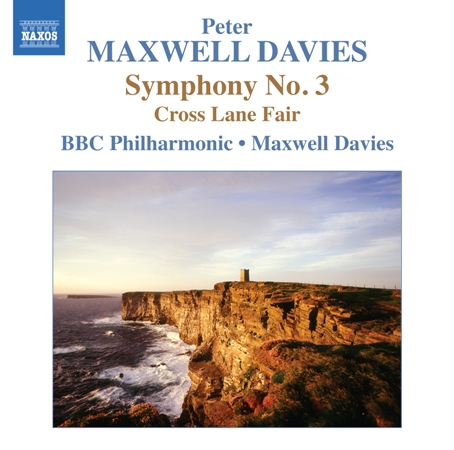
A quiet month. Only Naxos – as usual – has produced new albums of recent music. Three of these are in its American Classics series. There is a recording of music by Alan Hovhaness with his Symphonies 1 and 50 and Mount St. Helen with Schwartz and the Seattle Symphony Orchestra; Peter Menin's Symphony No. 3 and the concertato Moby Dick, also with the Seattle forces; and a programme of David Del Tredici piano works, the first recording in a complete survey, including: Aeolian Ballade, Ballad in Lavender, Ballad in Yellow, S/M Ballade and Gotham Glory. The Hovhanesss and Menin, who were near contemporaries, make an interesting contrast, the Hovhaness wholly refusing to engage with modernism, Menin more astringent even if still essentially tonal. Del Tredici, who unlike the other two is still alive, is known as the father of American Neo-Romanticism. His works are attractive and approachable, though, especially in the 'pianistic terror' that is S/M Ballade, with plenty of substance too.
Perhaps the most important of Naxos's releases this month is a new recording of Maxwell Davies's Symphony No. 3 and Cross Lane Fair, since it is features the composer himself in charge of the BBC Philharmonic Orchestra. The symphony owes much of its structure to the principles of architecture, though Davies has also written that 'the architectural proportional devices...related at least as directly to the spiralling mollusk shells on my desk...and to the spirallings of the huge breakers crashing in from the Atlantic on that same shore.' Like many of his pieces, therefore, it is very firmly rooted in his adopted island of Orkney. Written in four movements that might, in their slow-fast-fast-slow plan, owe something to Mahler 9, it is a work of great power that, nevertheless (and perhaps like Mahler), requires the listener to work at its understanding. As if to sweeten the deal it is paired with the much lighter Cross Lane Fair, an attractive and accessible work that is inspired by memories of a fairground near Salford.
The 20x12 project continues to be a great source of discovery and, to my mind, the most interesting offshoot of the Olympic Games. NMC have recently released three new pieces in the series: The Voyage by Michael Wolters, Zatopek! by Emily Howard and Fire by CT founder David Bruce. These new works greatly enrich what was already a delicious smorgasbord of new music. As before, they are available as a subscription download, and as individual tracks on iTunes, Amazon and Spotify.
0 comments
Perhaps you needed to be a brass player fully to appreciate Mark Anthony Turnage's Canon Fever, the world première of which opened the First Night of the Proms on Friday. Ruthlessly and relentlessly written, it provided the BBCSO players with a chance to exhibit the exuberant, atavistic side of their musical personalities. The result was three minutes of exhilarating music. It was a breath of fresh air in a concert that then descended into patriotic navel-gazing. Catch it on BBC iPlayer whilst you can.
0 comments
A short guide to the music of William Mathias, who died 20 years ago on 29th July.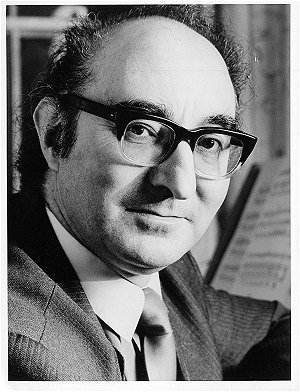
I hail from the same part of the world as this most brilliantly communicative of composers. As with all who attended the old grammar school in the unexceptional town of Whitland, Carmarthenshire, I used to sing a work by Mathias at the beginning and end of every term, his School Song. Born in the town in 1934, Mathias had written the piece whilst a pupil at the school at the age of 11 or 12. It is a precocious work, with a shapely tune that comes to a rousing close, supported by effortlessly successful harmony. It is sad that, on turning comprehensive in 1989, the School Song, possibly Mathias's most performed work, was dropped.
The gusto with which normally unparticipative pupils sang Mathias's School Song suggests that his ability to communicate was an inherent part of his musical personality. It was a tendency that would eventually leave him, like Britten, at odds with the post-war avant-garde. Mathias was acutely aware of this. At the 1979 Menai Music Festival Lecture, he articulated his personal view that early twentieth-century innovations had led not, as some in the avant-garde believed, to a new unified system, but to the disintegration into various systems in which a composer should find his own place. It now seems obvious that this view was correct. As for his position in this pluralistic scene, in a BBC documentary devoted to his music, he railed against what he saw as the limited expressiveness of some twentieth-century music, which, he felt, sometimes gave the impression 'that music is there to talk insistently about tragedy, that it must always be unpleasant because that is the essence of our time.' He underlined this by going on to say that 'music...does many things: it can be tragic...[but]...it can also be extremely happy and it can be, in my view, an act of praise.'
These statements provide the key to understanding Mathias's music. The composer showed an uncanny knack for writing music of great range, both within pieces and between pieces, which nevertheless sounds like it is by the same person. By this I mean that he was just as capable of writing a good tune forged from tonal materials (though not actually using tonal procedures) as well as 'difficult' textures with high levels of chromatic density. As with the music of Benjamin Britten, this makes him a good starting point for those wishing to become accustomed to the sounds of new music. This was the function Mathias served for me as a teenager as I gradually got to know his music. It unlocked my ears, accustoming me to more adventurous sounds, which then allowed me to explore more experimental music.
The most familiar works by Mathias are his carol sequence Ave Rex, which includes the perennially popular Sir Christemas; A Babe is Born; and Let the People Praise Thee O God, the anthem written for the ill-fated wedding of Charles and Diana. All are rollicking pieces, superbly written for maximum tuneful effect. Whilst there are many other works in a similarly attractive style, Mathias also wrote more serious church music. There is the visionary and transportive As Truly as God is Our Father, the astringent Jesus College Service and the cerebral Four Latin Motets. There are three good discs for those who wish to explore this music: Christ Church Cathedral Choir conducted by Stephen Darlington on Nimbus, Wells Cathedral Choir and Matthew Owens on Hyperion and one released by the American choir Gloriae Dei Cantores, conducted by Elizabeth Patterson. My personal favourite, especially because of the immediacy of the recording, is Stephen Darlington and Christ Church. A better choice for newcomers, however, might be Matthew Owens and Wells Cathedral, since the disc also contains several of Mathias's organ works, including his catchy Processional. This provides a way into his substantial and serious organ works such as Berceuse, Antiphonies and Fenestra. These have been recorded both by John Scott on the organ of St. Paul's Cathedral on Nimbus and Reichard Lea (in a double disc survey of Mathias's complete organ output) on the organ of Liverpool Metropolitan Cathedral on Priory.
Mathias was also known for his large choral-orchestral works. One of these, World's Fire, is, sadly, unrecorded. This Worlde's Joie, Mathias's rumination on the seasons of the year and the stages of life, is available on Lyrita with an orchestral version of Ave Rex and his powerful setting of the thirteenth-century poem Elegy for a Prince. Perhaps his choral best (a phrase he himself used of the work) is, however, his Requiem Mass written in memory of his mother, Lux Aeterna. Whilst clearly deriving inspiration from Britten's War Requiem it is, in contrast, a work of extraordinary radiance. It is available in an electric performance with the LSO and Bach Choir conducted by Willcocks on Chandos. It is one of my most treasured recordings.
Mathias's output also includes a number of concertos, three symphonies and a wide variety of chamber music. Symphony No. 1 and Symphony No. 2 Summer Music are available on Nimbus with the BBC Welsh Symphony Orchestra (now the BBC National Orchestra of Wales) under the baton of the composer. They make a fascinating pair. The first energetic and tuneful, the second dark and brooding. The years between the two symphonies were marked by orchestral works that Mathias called 'landscapes of the mind': Laudi, Vistas, Helios and Requeiscat. Helios and Requiescat, are available with the Third Symphony and Oboe Concerto, also with BBCNOW on Nimbus. Laudi and Vistas are available on Lyrita together with some early works -- Dance Overture, Divertimento for String Orchestra, Invocation and Dance and Sinfonietta -- that are both brilliantly written and outrageously good fun. The middle movement of the Harp Concerto shares both thematic material and the lamenting atmosphere of Elegy for a Prince, but is typically framed by two highly attractive and accessible movements. It is also available on Lyrita together with his Clarinet Concerto and the infectiously raucous Piano Concerto No. 3. For those interested in exploring Mathias's chamber music I recommend two discs: a recording of his three string quartets with the Medea Quartet on Metier and a disc that includes Mathias's Sonata No. 1 and No. 2 and Piano Trio on Koch.
For more information, visit the composer's page at OUP.
0 comments
.jpg)
On July 2nd, Avid Technology, the company who recently acquired Sibelius Software, announced a major restructuring. This included the shedding of 350 jobs and the sell-off of the audio peripheral division M-Audio and its consumer video division to Corel Corp in Ottawa for $17 million. According to an article on pro-tools-expert.com this restructuring will also include the closure of Sibelius's UK office. They quote one Sibelius team member as saying: 'this is heartbreaking, it took us 15 years to build this business and it took Avid 15 months to wreck it.' Whilst Ian Bruce, Director of Communications at Avid, stated yesterday on Twitter 'Let there be no doubt - Sibelius stays with Avid', it remains unclear as to how the reorganization will affect future development of the software.
0 comments
I've just updated CT's concert listings for July. Festival season gets into full swing this month, however, so, with so much going on, it would hard to make that list comprehensive. Instead I'll also try to summarize the festivals in which much of the music is being played, as well as a few highlights.
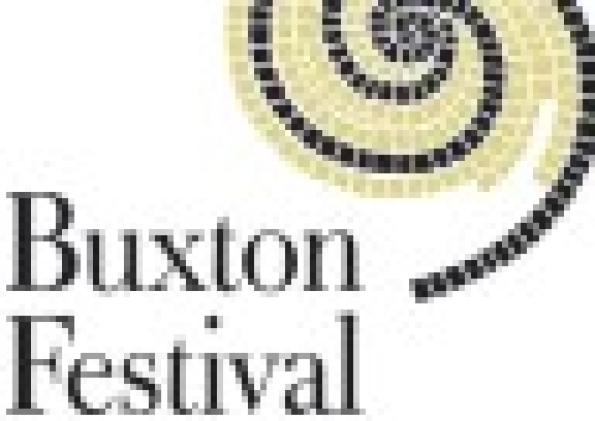
The Buxton Festival runs from 7th- 25th July. It is dedicated to music, opera and books. Whilst that doesn't include much in the way of contemporary music there is, nevertheless, a new productions of Britten's masterpiece, The Turn of the Screw, to look forward to on 16th and 20th July.

The Cheltenham Music Festival (4th- 15th July), contains a number of interesting new music concerts, handily summarized on their own page. It includes a Goehr Horn Trio première, a production of Edward Rushton's opera Babur in London and a concert of new music given by the BBC Singers that includes five premieres.

The Schleswig-Holstein Musik Festival starts on 7th July and runs almost to the end of August. The focus of the programme this year is on Chinese culture, including the contemporary music scene. Details can be found on the festival website, here.
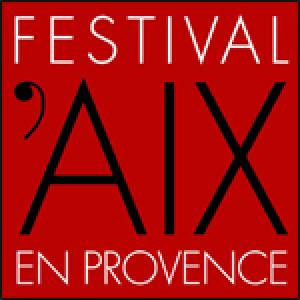
The Festival 'Aix en Provence (5th-27th July) features the world première of George Benjamin's new opera Written on Skin. It is based on an Occitan legend from the 12th century and explores the consequences of self-discovery and the limitations of human power. Performances are on 7th, 9th, 11th and 14th July.
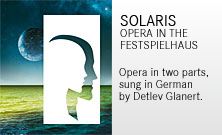
There is also a new opera at this year's Bregenz Festival, Detlev Glanert's Solaris, based on the novel by Stanislaw Lem. The work was also turned into a great film by Andrey Tarkovsky in 1972, so this new interpretation will have much to live up to. The premiere is on 18th July.
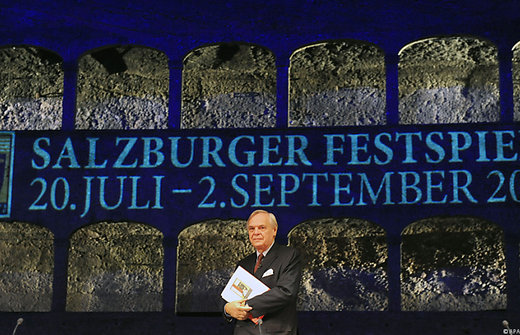
The Salzburger Festspiele runs from 20th July to 2nd September. It contains a series of concerts entitled 'Salzburg contemporary', including works by Lutoslawski, Dallappiccola, Boulez, Berio, Zimmerman, Scelsi, Ligeti and Stravinsky. A complete guide can be found here.
There are two other music festivals that may be worth investigating, though, at the time of writing, neither had published their programmes. They are the Schlern Festival (5th-25th July) and the Highscore Contemporary Music Festival (23rd July- 4th August). Both promise updates soon on their websites. Finally, don't forget that the Proms season gets going this month. A full preview can be seen in my earlier blog post, here.
0 comments

A relatively quiet month in terms of CD releases, but one nevertheless marked by some interesting finds.
Naxos, as ever, has released a clutch of new recordings. Two of these are in its continuing American Classics series: a collection of Hailstork orchestral music, including American Port of Call, Symphony No. 1 and 3 Spirituals with the Virginia Symphony Orchestra and Chorus under the baton of JoAnn Falletta; and Leshnoff chamber music - String Quartet No. 2, Seven Glances at a Mirage, Cosmic Variations on a Haunted Theme and ...without a chance - played by the Carpe Diem String Quartet and Opus 3 Tri. Both make for interesting listening, the Hailstork richly accessible in the manner of film music, the Leshnoff imagined with a fine ear for instrumental sonority that, especially in a work like ...without a chance, evokes something of Javanese Gamelan.
These composers are balanced by two stalwarts of the European tradition. Penderecki's Fonogrammi, Horn Concerto, Partita, The Awakening of Jacob, Anaklasis and De natura sonoris, are played by the Warsaw Philharmonic under Wit; Messiaen's Et exspecto resurrectionem mortuorum, Le tombeau resplendissant and Hymne by the Lyon National Orchestra under Markl. Whilst generally dark in tone, the Penderecki programme shows the wide range of influences upon the composer, from his use of new sonorities associated with his avant-garde days, to neo-romanticism and jazz. The Messiaen programme is dominated by Et expecto, his profound rumination on two world wars. The other two pieces, are earlier works that, especially in Le tombeau replendissant, written when he was 23, show his remarkable precocity
I was once told by a respected musical figure that Shostakovich wasn't a great composer. That immediately sent me back to listen to my favourite work of his, the Fourth Symphony. It is a work of extraordinary range and transcendental power, easily confirming that his reputation is very much deserved. I've always loved Simon Rattle's hard-driven recording of the work with the CBSO on EMI, but Esa-Pekka Salonen's live recording of the work with the Los Angeles Philharmonic just released on DG is also worth checking out, especially as it is paired with a remarkable premiere recording of a recently discovered and reconstructed operatic prologue, Orgango.
NMC have just launched their Debut Discs project, which offers emerging composers an international platform for their work. They are being supported by Peter Maxwell Davies, who spoke eloquently on the launch day about the initiative. The first three discs in the series were launched this month, featuring the works of Huw Watkins, Dai Fujikura and Sam Hayden. The new recordings are available on Spotify, though some tracks are withheld in order to encourage you to buy. For those interested in the physical product, the CDs are handsomely produced with striking cover designs by students from Central Saint Martins College of Arts and Design. Composers who will feature in future releases include Helen Grime, Joseph Phibbs, Ben Foskett, Richard Causton and Charlotte Bray.
0 comments
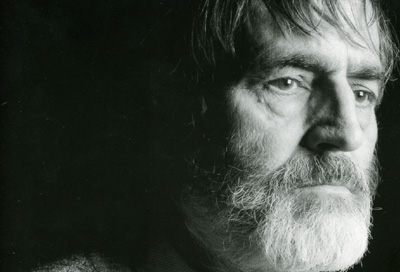 |
|
Helmut Lachenmann. The latest composer to feature in Tom Service's guide to contemporary music. |
I recommend checking out Tom Service's excellent and evolving guide to contemporary music on the Guardian website. It started at the end of April and, during the course of a year, promises to give an introduction to a new composer each week. To qualify, a composer must either have been born within the last one hundred years or be still alive.
The list of composers is prefaced by a passionate defence of new music that deserves to be widely read. I especially love the comment about the willingness of children, who don't come to music with any baggage, to engage with more 'difficult' works.
The guide so far includes portraits of: Elliott Carter (the only composer not born within the last one hundred years who still qualifies for inclusion), Pauline Oliveros, Harrison Birtwistle, John Zorn, Judith Weir, Oliver Knussen and Helmut Lachenmann. Each also contains a rich range of embedded links, including some to full performances of works on You Tube.
0 comments
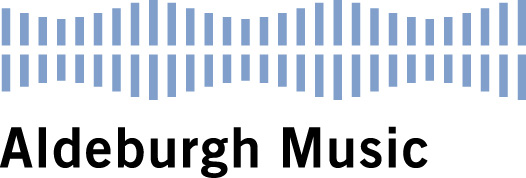
I did - just - manage to update CT's concert directory in time for June a few days ago. However, I also wanted to point out a few festivals that take place this month, especially since, on the whole, I have not included their concerts in that listing. I would have done this yesterday, but instead watched the rather splendid barge procession on the Thames, a day dampened only slightly by the bad weather and the disappointing TV coverage. I was especially surprised that the BBC didn't seem to have thought of putting a microphone on any of the music barges. I didn't catch any of the New Water Music.
There are couple of interesting festivals on the continent this month. The first, the KunstFestSpiele Art and Drama Festival, is already underway, but continues until 17th June. Taking place in the beautiful Royal Gardens of Herrenhausen, Hanover, there is much to enjoy in the rest of the festival, including the BBC Singers performing Britten, Bitwistle and Stevie Wishart on 7th June; the pianist Marino Formenti playing Liszt, Kurtag, Pesson, Nancarrow and Rihm on 9th June and Evelyn Glennie performing new works with the Tapei Chinese Orchestra on 17th. The short Zeit Für Neue Musik festival takes place in the Kammermusiksaal der Firma Steingraeber & Söhne, Bayreuth from 21st June to 24th and includes works by Cage, Andriessen, Ligeti. Tober-Vogt, Bartok and others.
In the UK, the St. Magnus International Festival runs from 22nd to 27th June. It includes the chance to hear Marc Neikrug's harrowing Through Roses and Maxwell Davies' Miss Donnithorne's Maggot on the first day; Davies' Ojai Festival Overture, Alasdair Nicholson's Backward Glances on 23rd; Distance and Enchantment by Judith Weir, dansmusik by Alasdair Nicolson on 24th; and the world premiere of a new work by Arne Gieshoff on 26th and of Paul Crabtree's Utopian Visions on 27th. The Aldeburgh Festival, finally, runs from 8th-24th June. Highlights include Oliver Knussens's Where the Wild Things Are and Higglety Pigglety Pop! on 8th June and, on various dates, premieres by Elspeth Brooke, Jonathan Dove, Oliver Knussen, Kurtag, Barnabas Dukay, Carter and even the European premiere of a Charles Ives' work, his vast, unconventially orchestrated and unfinished Universe Symphony. The complete programme can be viewed here.
0 comments
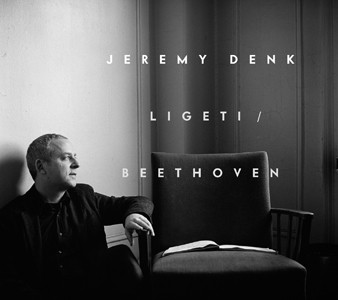
I've spent the last few days listening to a couple of new CDs. The first involves violinist Hilary Hahn, whose recording of Ives violin sonatas I reviewed a few months back. This time she has teamed up with pianist Hauschka (Volker Bertelmann) in a new recording on DG entitled Silfra, named after a geographical feature near Rekjavik, where the North American and Eurasian tectonic plates meet. To some degree this is a metaphor for the disk, since it represents a meeting of two very distinct musical personalities. The disk is, however, a crossover with a difference. Hahn is leaving her normal comfort zone not so much in terms of genre: whilst Hauschka's recordings do owe a great deal to more popular styles such as house music (listen, for example to his incredibly catchy disk Salon des Amateurs), he is also linked to mainstream composition via his use of prepared piano in the manner of Cage. For Hahn, however, this represents new territory in that the recording is more or less improvised.
The partnership between the two began back in 2009 and in the intervening period they have been meeting for free-form improvising sessions. This disk is the fruit of that collaboration. Many will find much to admire. Perhaps taking the lead from the rich range of sounds Hauschka elicits from his instrument, Hahn responds by eschewing the warmth of her instrument in favour of a hard sound often devoid vibrato. Instead we are treated to almost inaudible pizzicatos, fleeting scrapings, high harmonics, tremolando sul ponts, relieved by only the occasional melody. The music is skilfully improvised, even if I found it often harmonically static and perhaps a little too reliant on textures that gradually accumulate counterpoints. The result is a pool of ideas that is, perhaps, a little too easy to take in one go. It's all very Zen and I can see why the marketing people are having a field day, trumpeting the release of a vinyl special edition and a world tour. To my own mind I prefer something with a bit more meat.
And if it is meat you're after, why not check out Jeremy Denk's premiere recording on Nonesuch consisting of Ligeti Piano Etudes Books One and Two paired with Beethoven's Piano Sonata No. 32 in C Minor. It feels pointless trying to explain in words the brilliance of Ligeti's Etudes, so I'll simply say that, if you don't know them, go and buy this recording immediately. Denk plays with complete technical and aesthetic authority in this demanding repertoire and, whilst the recording doesn't supplant Pierre-Laurand Aimand's also superlative recording on Sony, many will prefer this disk because of the intelligent placement of the Beethoven mid-programme. Ligetians will want both.
Other releases
Releases on Naxos include: a new recording of Bartok's Concerto for Orchestra and Music for Strings, Percussion and Celesta with the Baltimore Symphony Orchestra under Marin Alsop; Songs for Lada and To the New World by Belarus-born composer Alla Borzova; a disk of Richard Danielpour symphonic and choral music with the Seattle Symphony Orchestra and Chorale under Gerard Schwatz; a new recording of Britten songs performed by Iain Burnside and Roderick Williams; Gorecki's Concerto-Cantata and other works with the Warsaw Philharmonic under Antoni Wit; three orchestral pieces by Morton Gould with the Seattle Symphony again under Schwarz; and Maxwell Davies' Symphony No. 2 and St. Thomas Wake with the BBC Philharmonic under the composer. As well as the 20x12 recordings mentioned in my last blog post, NMC have also released a recording of music, including Colossos or Panic, by Alexander Goeher with BCMG under Oliver Knussen. DG and Decca are also reissuing a number of interesting recordings at the moment that are worth checking out. These include: Cage Sonatas and Interludes, Birtwistle's The Triumph of Time, Berio's Sinfonia, Varese's Ameriques, Stockhausen's Gruppen and Steve Reich's Drumming.
0 comments
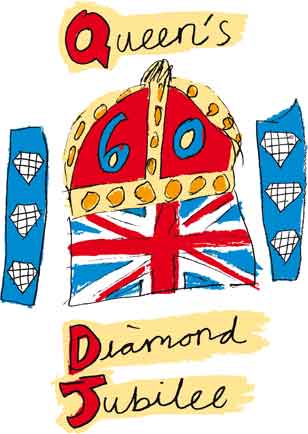
A summer of flag waving begins in a week with the official celebrations of the Queen's Diamond Jubilee on 2-5th June, followed, on July 27th, by the opening of the London Olympics.
For those who prefer their celebrations to be a little more cultural than bunting and beer, however, it's good to see that both celebrations have involved the commissioning of new music. The barge procession on the Thames on June 3rd will include the premiere of the New Fireworks Music by a group of film music composers that include Anne Dudley, Graham Fitkin, Gavin Greenaway, Christopher Gunning, Adrian Johnston, John Lunn, Julian Nott, Jocelyn Pook, Stephen Warbeck and Debbie Wiseman. I think some movements have already been premiered on Radio 3. I missed this, however, and so am looking forward to hearing it on the day. A recording of the work is due to be released on 28th May.
Given the amount of money that the Olympic Games has sucked up, one suspects, at least in part, from arts organizations, it is nice to see a few crumbs being thrown back to composers. A full programme of these events can be viewed here. One of the most interesting of the projects is entitled 20x12, and involves the commissioning of twenty new sport inspired works. More information, and the composers involved, which include CT's founder David Bruce, can be found on the NMC website. So far four of these pieces have been released as recordings (also available via Spotify): Howard Skempton's Five Rings Triples, Sally Beamish's Spinal Chords, Luke Carver Goss's Pure Gold: A 4x4 Relay Race and Anna Meredith's Hands Free. I especially enjoyed Beamish's work, a simple but effective setting of Melanie Reid's moving account of becoming paralysed. There is a chance to hear all of the 20x12 works at the Southbank Centre during the weekend of 13th-15th June.
0 comments
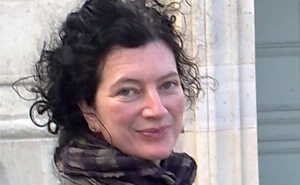
Susanna Eastburn has been appointed as new Chief Executive for Sound and Music. Eastburn is currently Director, Music, Arts Council England and has an impressive track record in the arts sector, including five years as Artistic Director and Chief Executive of the Huddersfield Contemporary Music Festival, a fellowship of the Clore Leadership Programme, Executive Producer of London International Festival of Theatre and Chair of SPNM. She has also worked in music publishing and as a Governor of Leeds College of Music.
Given that her appointment comes at a difficult time for SaM, with falling funding and criticism from composers, there will be many watching her progress, especially since, as Chair of SPNM, she played a crucial part in its incorporation into the new organization. It is worth checking out this video from 2010 to hear her rationale for this move. Some may find her arguments unconvincing, especially given that she describes that with SPNM 'there was no immediate urgency to change our position. It was performing very well. It was doing a great range of activity. It had a clear mission and purpose'. The board's rationale, however, was that SPNM 'had reached its capacity...it was at the top of what it could do and could go no further and there was a sense that we wanted to do more for new music.' Many would say that SaM has failed in this mission. Susanna Eastburn's recognition of the good work that SPNM did and a presumed desire to see that its incorporation is a success might, however, mark a turning point for the organization.
0 comments
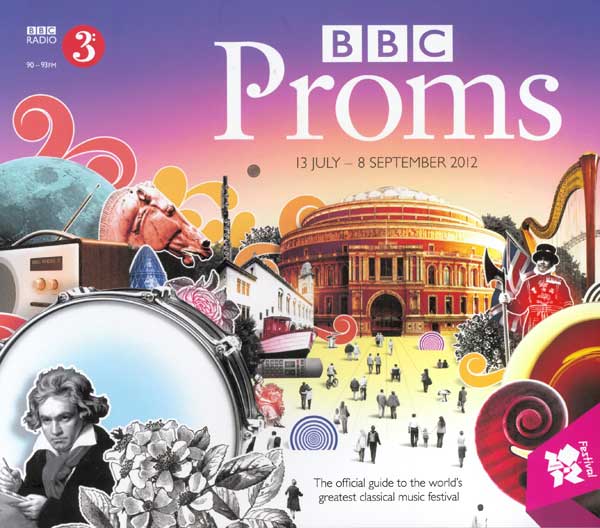
Now here's a funny thing. Last year the BBC Proms website had an excellent guide to the new music that was to appear during the season. This year we have all manner of categories, including 'Classical for starters', 'For families', 'World music and jazz' and even 'For poets', but nothing to show concerts featuring living composers. Your best bet for finding new music is to take a look at their listing of all composers, following the links to the concert in which their music appears. Alternatively, here's my own quick summary and a few picks.
The 2011 season featured a great deal of music by Frenchmen, especially by one of my favourite composers, Henri Dutilleux. Given the theme, however, it was surprising to see no Pierre Boulez on offer, which caused me to half-seriously wonder whether it was because Dutilleux and Boulez have a history of not getting on. This year, quelle surprise, there is plenty of Boulez but no Dutilleux. Four of these concerts - on 20th, 21st, 23rd and 24th July - take place under the baton of Daniel Barenboim with the West-Eastern Divan Orchestra. The works, Derive 2, Dialogue de l'ombre double, Mémoriale ('...explosante-fixe..' Originel), Messagesquisse and Anthèmes 2 all appear between a complete survey of Beethoven symphonies (except for No. 9, which appears in a separate concert). There is also a chance to hear Boulez conduct members of the West-Eastern Divan Orchestra on 26th July in his iconic Le marteau sans maître, this time paired with Beethoven's Piano Quintet in E flat major.
I've counted a healthy 11 world, 3 UK and 3 London premières this year. Heading the first category is James Macmillan's new work Credo, performed by three Proms-debuting choirs accompanied by BBC Philharmonic under the baton of Juanjo Mena on 7th August. Also a big name, Mark-Anthony Turnage's short Canon Fever receives its world première with the BBCSO on the First Night (13th July). Both these concerts will be broadcast on BBC television. Simon Bainbridge's The Garden of Earthly Delights, receives its first outing in the afternoon of 18th August with Birmingham Contemporary Music Group. That concert also features the music of Alexander Goehr and Oliver Knussen. Also standing out for me was the première of Helen Grime's Night Songs, with BBC National Orchestra of Wales, this time with Knussen holding the baton. I interviewed Helen Grime, an up-and-coming composer well worth checking out, for CT a few months ago. Other brand new works this year are: Fung Lam's Endless Forms on 18th July; Julian Philips' Sorowfull Songes on 23rd July; Benedict Mason's meld on 28th July; Elaine Agnew's Dark Hedges on Saturday 4th August; Thea Musgrave's Loch Ness - a Postcard from Scotland on 5th August; Brian Elias's Electra Mourns on 11th August; Gavin Higgins' Der Aufstand and Gavin Bryars' After the Underworlds on 12th August; and Eric Whitacre's Higher, Faster, Stronger and Imogen Heap's The Listening Chair on 29th August.
UK premières are: Michael Finnissy's Piano Concerto and Harrison Birtwistle's Gigue Machine in an afternoon concert on 11th August that also includes Brian Ferneyhough's Prometheus; and Kaija Saariaho's Laterna magica on 17th July. London premières are: Nico Muhly's Gait on 4th August; James MacMillan's Olympic Fanfare on 5th August; and Maxwell Davies's Symphony No.9 on 23rd August. The Muhly is with the National Youth Orchestra, who will also be playing Varèse's Tuning Up, Messiaen's Turangalila Symphony and Anna Meredith's HandsFree.
One purely personal pick to finish. The late-night concert on 14th August contains a clutch of marvellous pieces. Whilst I don't know Xenakis's Phlegra or Andriessen's De snelheid, there is a not-to-be missed chance to hear (preferably to see as well) Ligeti's Poèmes symphonique for 100 metronomes, a work that, in both its elegant simplicity and frightening complexity, rather sums up the composer's thinking at the time. Jonathan Harvey's Mortuous Plango, Vivos Voco is now something of a modern classic. Written for eight track tape and using the sound of Winchester Cathedral's tenor bell and the treble voice of the composer's son (who, at the time, was a chorister there), it is a work of ravishing beauty. Finally, there is the chance to 'hear' Cage's always-provocative piece of non-music (or is it?), 4'33''.
0 comments
I've just updated CT's concert listings for May. I haven't, however, included details for three interesting festivals that will be taking place this month, which instead I shall write about here.
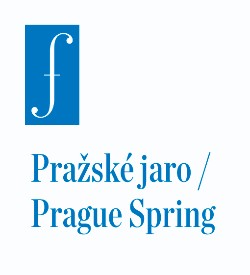
The Prague Spring International Music Festival (12th May to 3rd June) contains much to interest new music lovers. There is the chance to hear two masterpieces of twentieth-century opera: Stravinsky's The Rake's Progress on 22nd May and Benjamin Britten's Gloriana on 25th May. Several concerts also include world premières. There is Petr Kofron's Imaginári symphonie and Ivan Acher's Iz iz a mam dz I t'ing in a John Cage tribute concert on 14th May; a new Vit Zouhar chamber work on 15th May; Jiri Kaderabek's C (Czech première) on 21st May; and Lukas Sommer's Letter to Father, Concerto for Flute and Chamber Orchestra on 28th May.

The Sounds New Contemporary Music Festival in Canterbury (4th - 15th May) is titled 'Theme GB', the emphasis being on contemporary British music. There are a number of significant works on the programme, including John Taverner's Magnificat, Jonathan Harvey's Bhakti, Thomas Adès' Arcadiana and Peter Maxwell Davies' A Mirror of Whitening Light. There is also a chance to hear Peter Maxwell Davies in conversation on 4th May. John Croft's new chamber opera A Fury's Curses also receives its première on 10th May.
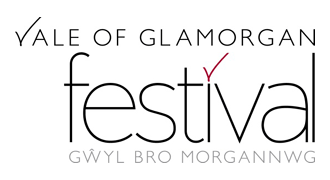
In Wales, the Vale of Glamorgan Festival (1st May-11th May) has moved from early autumn to this new springtime slot. It marks two significant birthdays - Philip Glass's 75th (concerts including The Mavron Quartet on 6th May and Gilt Ensemble) and Per Norgard's 80th (concerts including Ars Nova Copenhagen) - as well as exploring the music of Gavin Bryars (Gavin Bryars Ensemble), Craig Vear (Open Work Ensemble), Qigang Chen (concerts including BBC National Orchestra of Wales on 4th May and 11th May) and a number of his Chinese contemporaries.
0 comments
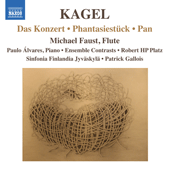
KAGEL, M.: Das Konzert/ Phantasiestuck / Pan (M. Faust, Alvares, Ensemble Contrasts, R. HP Platz, Sinfonia Finlandia Jyvaskyla, P. Gallois). Naxos 8.572635
The more I read contemporary music reviews and CD notes, the more I realise that many of them say next to nothing of interest on the topic they are supposed to be illuminating. The classic method of writing about a piece of contemporary music is to start with a long piece of biography that adds nicely to the word count. It is then followed by a flowery description of the general nature of the music, or a bar-by-bar description that actually exhibits little understanding of the actual shape of a piece.
Sometimes the poor writer has good reasons for doing this. He or she may be writing about a well-respected grandee of contemporary music and so doesn't want to rock the boat. And the biggest fear one has when writing about contemporary music is displaying one's own ignorance. What do you mean you can't hear that repeating serially transformed motive? Didn't you realise that it wasn't out of tune but written in eighth tones? Rather than try to say anything too firm we resort to generalisations.
After some good background notes, including excellent observations that place the music of Kagel in the context of postmodernism, we get the following description of Das Konzert in the sleeve notes to this new disk on Naxos:
Over pizzicato rhythms and gentle harmonic clusters, the flute unfolds a capricious yet evocative melodic line that weaves its way in and out of the strings' translucent backdrop. The on-going contribution from the tom-toms and woodblock adds to the variety of the overall texture, while the strings form ghostly ostinato patterns which gradually assume a more openly expressive manner as the soloist has recourse to flutter-tonguing among other playing techniques.
And so it goes on. Descriptive writing, that in its lack of even any Toveyesque analytical value tells an interesting story. The fact is that, despite the endlessly fascinating textures and use of extended techniques, the attractive mixture of new and old harmonic and melodic patterning, I, I suspect like the CD note writer, was often left scratching my head as to the wider shape of this often episodic music. Das Konzert, described as 'Kagel's typically oblique response to writing a flute concerto' in particular, feels like a series of highly felicitous but unconnected 'moments'. Phatasiestuck, which is presented twice on this disk, one version for flute and piano, the other with the addition of a string quartet and clarinet, starts with a jaunty rhythmic exchange between soloist and pianist (I write here of the piano/flute version). There follows a little section for flute multiphonics and then a brilliantly witty martial exchange with the flute blowing though the instrument (not producing a note and sounding rather like a snare drum) and the pianist tapping the body of the instrument. There follows sections of folksy music that evoke Petrushka. It is all great fun, but, frustratingly, I couldn't always connect each idea into a wider narrative. Pan, on the other hand, perhaps because of its brevity, made much more purely musical sense to me, its opening major and minor five-note scale on piccolo forming the basis of a continuous variation, with much of the quartet writing making reference to familiar chamber music gestures. Perhaps, with more time, I might have reached a similar conclusion for the other works on this disk but, as I write, and unless you are a Kagel aficionado (in which case don't hesitate), I'd Spotify rather than buy.
The rest of the month's releases
Other than the Kagel release, on Naxos there are four other recordings of interest this month: Weinberg's Symphony No.6 and Rhapsody on Moldavian Themes with the St. Petersburg State Symphony Orchestra conducted by Vladimir Lande; Khachaturian's Gayane Suite No. 2 and Spartacus Suite no. 2 and Prokofiev's Cinderella Suite No. 1 with the St. Petersburg and Ukranian State Symphony Orchestras; Messiaen's Visions de l'Amen and Debussy's En blanc et noir featuring pianists Ralph van Raat and Austbi Hakon; and a selection of Stravinsky works for Violin and Piano featuring Carolyn Huebl and Mark Wait. Nimbus has released a new disk of twentieth-century works for cello and strings featuring the music of Lutoslawski, Maconchy, Hindemith, Patterson and Kopytman played by cellist Raphael Wallfisch. On Hyperion there is a new recording of Bob Chilcott's Requiem and other works given by Wells Cathedral Choir under Matthew Owens. DG has released two excellent compendiums of what, I presume, are previous recordings by Boulez (unless he's been very busy recently). The first features the music of Messiaen over ten CDs. The second the music of Debussy and Ravel over six. At £35.99 and £26.99 respectively they look to be excellent value. Follow my links for more information. There are, finally, two interesting recording on NMC to check out: Alexander Goehr's Colossos or Panic and other works with Claire Booth, Hilary Summers, BCMG, BBCSO, ASKO and Schönberg ensembles conducted by Oliver Knussen (currently available for pre-order); and a new disk of chamber music by Rob Keeley featuring nine performers including the composer on piano.
0 comments
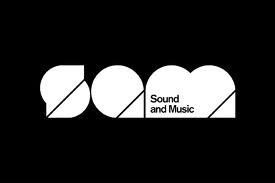
So did anyone sign the open letter to Sound and Music? I received a copy a couple of weeks ago, but in the confusion of moving house forgot about it. The letter, viewable here, must have been uncomfortable reading for SAM, since it effectively shows the organisation to be rejected by the very constituency it is supposed to serve. That view is leant weight by the number (250) and profile of its signatories (including Sir Harrison Birtwistle, Sir Peter Maxwell Davies, Julian Anderson, George Benjamin, Sir Richard Rodney Bennett, Martyn Brabbins, Michael Finnissy, Anthony Gilbert, Steven Isserlis, Oliver Knussen, Paul Mealor, Thea Musgrave and Judith Weir). The document went public in the Guardian on 30th March in a blog post by Colin Matthews entitled 'Why Sound and Music is failing today's composers'. That and the responses to his post on the same page are essential reading.
When I received the letter I was unsure what to make of it. I became aware of one of the forerunners of SAM during my student days, with several unsuccessful applications to the SPNM shortlist. Despite my failures, I thought, and still think, that the idea behind the shortlist was brilliant: a panel of highly regarded professional composers reading through a selection of anonymous scores. The composers whose works were considered 'best' were then nurtured over the course of their three years on the SPNM shortlist. A friend of mine got on the list, and was afforded some marvellous opportunities. I paid my SPNM fees each year, and tried to get on the list. Composers need to live in hope.
I heard about the amalgamation of SPNM into SAM at an SPNM organised composing with technology day. Apart by being stupefied by the name -- 'S&M', what on earth were they thinking of? -- I got the impression that the opportunities offered by SPNM would be automatically incorporated into SAM. I joined SAM specifically to apply to the new 'SAM' shortlist. It never appeared. Now I'm not entirely sure whether I'm still a member. I may be if I left a direct debit running. As such, the elimination of the shortlist was possibly a bad financial as well as artistic decision. Though shortlist application was open to non-members (through an appropriate fee), the competition itself was a great incentive to pay for membership. With last year's huge cut in funding to SAM, I wonder whether there is, indeed, a paying membership shortfall that is much missed.
What of the other criticisms in the open letter? I'm not really qualified to comment on the proportion of support offered to sonic art as compared to notated music. The letter rightly points out that the former is worthy of support, but the balance has become skewed unfairly in favour of it. All I can say is that I do receive a lot of bumph from SAM (I'm obviously still on a mailing list) and there seems to be a high proportion of opportunities levelled solely at sonic artists. This is a subjective view, however, so doesn't really constitute evidence. The criticism regarding the elimination of the BMIC seems to be better answered by SAM in their response to the open letter and in the comments section beneath the Guardian article. It points out that the BMIC collection was actually warehoused in 2007 because there were insufficient funds to keep it in London. It is SAM that has secured its future at Huddersfield University. Also on the positive side, I would agree that SAM's Embedded projects are a success. Another friend of mine successfully applied for one of these recently and had a new work played by the BBCSO on Hear and Now. These kinds of opportunities are priceless.
I do have one specific criticism of the types of opportunities offered by SAM that was not really covered in the open letter, however. The BBCSO Embedded project was limited to composers of a certain age (35 and under, I seem to remember). Subsequent projects, instead of giving a specific age, stipulated that they were for composers 'at the beginning of their careers'. This would also seem to imply for younger composers. I've got nothing against promoting and nurturing the young, but SAM, like everyone else, appears to be fixated with it. The other projects they list in their response to the open letter are indicative of this: the Sound and Music Summer School for 14-19 year-olds and the minute of listening project in schools. As I approach the grand old age of 40 I can see composing opportunities like those offered by Embedded drifting out of my reach. The great thing about the SPNM shortlist was that it was anonymous and open to all, regardless of age. It was a great leveller. In this youth obsessed age, what would have become of a late-bloomer in the mould of Janacek?
3 comments
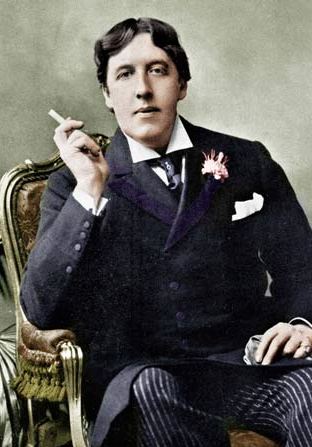 A little belatedly, perhaps, I've just updated the CT concert diary for April. As ever, the list is not exhaustive, and members are encouraged to add their own concerts to the list. It's a pretty good way of getting some free advertising, especially since the concert also appears on CTs 'Concert Listings Today and Tomorrow' pane on the website homepage. A little belatedly, perhaps, I've just updated the CT concert diary for April. As ever, the list is not exhaustive, and members are encouraged to add their own concerts to the list. It's a pretty good way of getting some free advertising, especially since the concert also appears on CTs 'Concert Listings Today and Tomorrow' pane on the website homepage.
Three concerts and two events stand out for me in this month's list. Not to be missed is Gerald Barry's already well-received setting of Oscar Wilde's farce masterpiece The Importance of Being Earnest, which receives performances on 26th and 28th of this month. Both will be conducted by Thomas Adès, who calls Barry his 'favourite living composer'. Conlon Nancarrow's brilliant piano rolls are the subject of the London Sinfonietta's concert entitled, appropriately, 'Impossible Brilliance' on 21st April. Many of the mechanical pieces will played in arrangements for human musicians, with the whole broken up with pieces by Cage, Tenney and Ligeti. Also of topical interest is a performance of Gavin Bryars' The Sinking of the Titanic, which will take place on 13th April, the centenary weekend of the disaster. Bryars' work originated in a piece in support of art students at Portmouth in 1969 and has evolved ever since, with each performance bringing fresh insights to the material. Two day-long events also attracted my eye. The first is a Colin Matthews study day on 28th April. I've only listed the concerts that take place on the day, but they are also broken up with two interviews with composer. Check out the Wigmore Hall link in the listing for more information. Also of interest is the Arvo Pärt Total Immersion Day at the Barbican, also on 28th April. I think tickets for the event have been in great demand, so it would be wise to check it out quickly.
0 comments
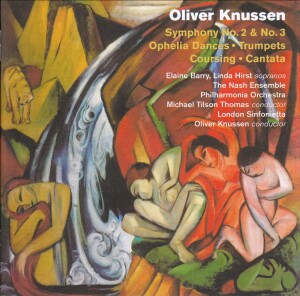
After a crazy couple of weeks, including a PhD viva and the presentation of a paper at the Sacher Perspectives Conference in Cardiff (same day as the Six Nations final - bravo Wales!), I'm happy to be able to get the keyboard beneath my fingers again and do some blogging.
I've always hoped, as an absolute minimum, to write regularly here about new music concerts and CD releases. It keeps me up to date with what is going on and, I hope, provides a useful point of information for visitors to CT. Unfortunately I managed to miss the CD roundup last month, so, completist that I am, I will also include releases from February in this month's roundup.
I've two specific CD picks this month, both of which are available on NMC. The first is a recording of Oliver Knussen's Symphonies No. 2 and 3; Trumpets, for soprano and 3 clarinets; Ophelia Dances, Book 1; Coursing, for chamber orchestra; and Cantata, for oboe and string trio. I've always loved the music of Knussen; he is a composer who, in works such as Flourish with Fireworks and the Horn Concerto, manages to produce a bright, attractive musical surface whilst in no way compromising the artistic integrity of a given work. Those who have got to know him via such pieces might, however, be a little surprised by the works on this disc, which come from a time when he was using classical serial techniques (later works were marked by greater octatonicism and rotational serialism). Whilst, perhaps, less immediately appealing, they still contain Knussen's trademark brilliant orchestration, lively textures and a penchant for plenty of variety in a short span. The First and Second Symphonies, for example, are in 3 and 4 movements respectively, but only last around fifteen minutes each. It's often said about the composer that, even when short, his works feel substantial. It is nowhere more true than in the pieces presented on this excellent disk.
The other recommendation on NMC is Michael Finnissy's Second and Third String Quartet's played by the Kreutzer Quartet. I once attended a seminar given by Finnissy before a pre-concert talk, which featured his English Country Tunes. The often-acid tone of what he said to us was very much present in that piece, ending as it does with the pianist practically crucified on the piano. It is the same here. The Third Quartet, for example, is Finnissy's 'response to the natural world and man's place in it', but, as in English Country Tunes, even passages of relative serenity feel tinged with bitterness. At the end of the quartet the presence of real birdsong seems only to emphasize the 'unnatural' i.e. contrived music of the quartet. Man, he seems to be saying, is an impostor in the natural world.
Quick Roundup
Also new on NMC is a disc of music by Morgan Hayes, including his Violin Concerto with Keisuke Okazaki, conducted by Christopher Austin. Naxos have released a number of interesting recordings over the last couple of months including: a complete survey of the orchestral works of Claude Debussy with Jun Märkl conducting the Orchestre National de Lyon; Pederecki's Sinfoniettas, Oboe Capriccio, 3 Pieces in Old Style and Serenade with the Warsaw Chamber Orchestra conducted by Wit; Ross Harris's Symphonies Nos. 2 and 3 with the Auckland Philharmonia conducted by Letonja; Maxwell Davies's Symphony No. 1 and Mavis in Las Vegas, with the BBC Philharmonic conducted by the composer; and Tadeas Salva's Cello Concerto, 3 Arias, Slovak Concerto Grosso No. 3 and Preludes with various soloists, the Slovak Radio Symphony Orchestra conducted by Marián Lejava. Hyperion have released a new recording of Benjamin Britten's Violin Concerto and Double Concerto played by the BBC Symphony Orchestra under Ilan Volkov; a disk of Shostakovich music for viola and piano with Lawrence Power and Simon Crawford-Phillips; and a collection of choral works by Bo Hansson performed by the Royal Holloway Choir under Rupert Gough. On Nonsuch there is a new disk of music by Vladimir Martynov played by the Kronos Quartet; an intriguing sounding disk of music by Penderecki and Jonny Greenwood; and a new recording of Philip Glass's opera Einstein on the Beach with the Philip Glass Ensemble.
0 comments
 |
|
Bregenz Staging of Judith Weir's Miss Fortune
|
As promised last month, my monthly roundup of concerts has now been moved to CT's own concert diary page. I've just updated the page, which now gives a really good at-a-glance view of what March holds for new music concert-goers. Again, members are encouraged to add their own concerts to this list.
My personal picks start with Judith Weir's new opera, Miss Fortune, which receives its British première on March 12th. You can read more about this in the interview I did with the composer last week. On the subject of opera, also not to be missed is John Adams' The Death of Klinghoffer, which continues its run at ENO with performances on 3rd, 5th, 7th and 9th March. Fans of John Adams also have a world première to look forward to this month with the first outing of his new piece Absolute Jest, to be performed by the San Francisco Symphony Orchestra at Davies Symphony Hall, San Francisco on 15th March along with another world première, Mass Transmission by Mason Bates. Other noteworthy new works include Nico Muhly's Cello Concerto and Owen Pallett's Violin Concerto at the Barbican, London on 16th March; Lyell Cresswell's Concerto for Piano and Orchestra, Samuel Holloway's Fault, Jack Body's Little Elegies and Liza Lim's Pearl, Ochre, Hair String at City Halls, Glasgow on 17th March; and Harrison Birtwistle's Fantasia on all the notes at the Wigmore Hall on 13th March.
My final pick contains a bit of self-advertising: The Sacher Perspetives Concert with the BBC National Orchestra of Wales on 16th March. This is being held in partnership with an academic conference in Cardiff University on 16th and 17th March. The conference papers will all be inspired by research carried out at the Sacher Archive in Basel, the concert will consist of pieces that were commissioned by Paul Sacher. I wrote some time ago about my own visit to the archive with a Mexican colleague, Mauricio Beltrán, to examine the sketch material for Dutilleux's Symphony No. 2. We'll be presenting the quite surprising the results of our research at that conference. Do come along if you're in town!
1 comment
Christian Morris talks to Judith Weir, whose new opera Miss Fortune will receive its UK première on 12th March at the Royal Opera House.
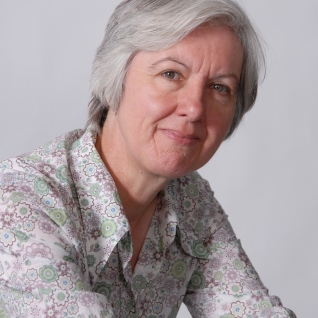 |
|
Judith Weir |
What drew you to composition? Do you remember your first pieces?
My first pieces were at secondary school. What drew me was finding something that would bring my performing friends together. I played music and I saw it as a fun activity rather than high-level art. I knew a very odd combination of performers. There simply didn’t exist the kind of music we needed to play and so I started to devise music that would fit everybody in.
You played oboe in the National Youth Orchestra. Was that something that you considered doing professionally instead of composition?
Difficult to think myself back. If ever I was that way minded I very soon didn’t think so. I played okay and, as you say, for a short time I played in the NYO, but never as a leading player and it was very clear to me, meeting top performers, that I wouldn’t ever be of that standard and anyway – I knew this from my teacher Robin Miller, who was a leading orchestral musician – I could see that it was a hard life as a player.
You had some lessons with John Tavener whilst at school. Was this as formal as, say, the Bridge-Britten arrangement?
I think it was quite the opposite. He was good enough to have me around to his house probably, in total, about five or six times over a couple of years. I lived in the same outer London suburb as he did and the person that introduced us was my teacher at secondary school, who vaguely knew him. So it was very good of him to give me the time because he was a celebrity young composer, not needing financially to do teaching as most young people do. He would look at what I had done and just make general comments which, nevertheless, were very good, because they were right on the button. I also heard about what he was interested in.
>> Read the rest of the interview here
2 comments
1 | ... | 24 | 25 | 26 | 27 | 28 |
|
Concert Listings Today & Tomorrow:
|